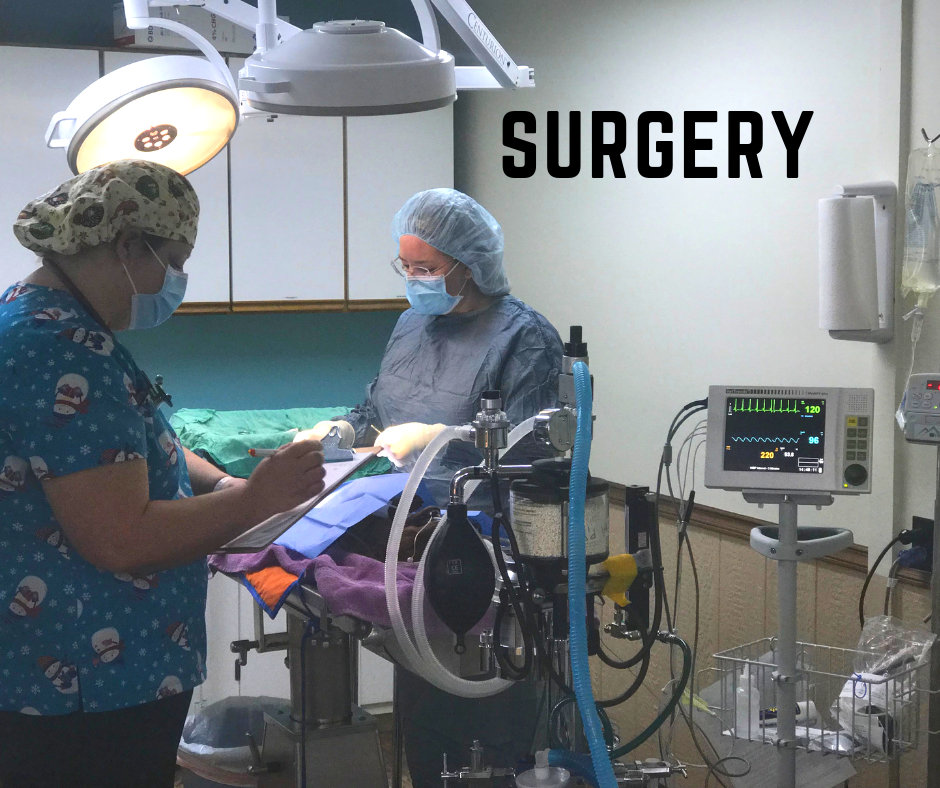Pet Surgery In Benton City, WA
Your pet is in good hands.
Our clinic offers a wide range of soft tissue surgical procedures. We very commonly perform spay and neuter surgeries as well as more complicated surgeries such as abdominal exploratories, mass removals, and biopsies.
We are not high volume, and limit the number of procedures we do each day in order to take the utmost care with each of our patients. A dedicated surgical nurse is with your pet every step of the way. At least two people closely monitor each and every patient throughout the procedure, and parameters such as oxygen saturation, blood pressure, heart rate, and temperature are continually monitored. Pain management is a vital aspect of our pre, intra, and post-operative surgical protocol.
Frequently Asked Questions for the Day of Surgery
Why does my pet have to be fasted?
It is important that anesthesia be administered on an empty stomach to help decrease the risk of vomiting once anesthesia drugs are administered. If a single small meatball is used for medication administration, that is usually ok.
Can my pet get their medication in the morning?
To decrease the cost to you, as well as decrease nausea from the anesthetic medications, we recommend starting a medication called Cerenia the night before surgery. We will need to dispense this in advance of your pet’s surgical procedure.
Why does my pet have to be at the hospital early in the morning?
What should I bring to the hospital for my pet?
When will my pet’s surgery happen?
When can I pick up my pet?
Can I visit my pet after surgery?
What do I do when we get home?
What should I have ready at home?
Important Questions to ask before choosing a Veterinary Hospital for your pet’s surgery:
Will a veterinarian perform a comprehensive exam prior to anesthesia on the day of surgery?
What other tests are performed before my pet has surgery?
At Sunrise Veterinary Clinic, we provide pre-anesthetic blood tests including a CBC (Complete Blood Count) and Biochemical Profile. We can perform these blood tests both in house and by sending them out to a veterinary laboratory. The CBC allows us to check the red and white blood cell counts and shows conditions such as anemia, infection, and low platelet count. The Biochemical Profile checks the function of the liver, kidney, pancreas, and other minerals and electrolytes. These blood tests can help us detect problems before there are obvious signs of disease in your pet. These tests are advised for all pets undergoing anesthesia.
Will my pet have an intravenous catheter and fluids during surgery?
What drugs or methods of anesthesia will be used on my pet?
We also intubate every surgical patient with an endotracheal tube at the start of surgery to provide oxygen and protect and maintain the airway. Anesthetic gas mixed in oxygen is delivered through this tube to fine tune the depth of anesthesia. We can also breathefor the patient using this tube and machine if/when necessary. The endotracheal tube also prevents aspiration of any fluids from the esophagus into the lungs. We feel it is inappropriate not to intubate a patient under anesthesia for several of these safety reasons.
We use pre-anesthetic medications to relax and calm pets before anesthesia,these medications also provide pain relief before the surgery begins. Sedatives also help us decrease the amount of anesthetic needed for general anesthesia.
How is my pet monitored during anesthesia?
We feel strongly that anesthetic monitoring is critical and therefore several vital parameters are checked constantly throughout the procedure and through recovery. Your pet is not left alone in a cage; we are with them through the entire anesthetic process. With thorough monitoring of your pet we are quickly alerted of any problems or changes and can make adjustments accordingly.
Sunrise Veterinary Clinic is fully-equipped with modern machines to measure blood pressure, heart rate, respiratory rate, oxygen content of tissues, and body temperature. For every surgery there is a least one and often two trained staff members present with your pet and monitoring these parameters constantly from the beginning of anesthesia until after your pet is recovered and breathing well following the procedure. We keep an anesthetic record with all the vital parameters recorded and drug amounts and fluid rates tracked for each patient.
What types of surgical care or standards are offered?
Every surgery at Sunrise Veterinary Clinic is performed by a licensed Veterinarian. We value continuing education and take advanced trainingseveral times a year to sharpen our skills and knowledge. We do not consider any surgery ‘routine’. Even though we perform several surgeries each day, we know that each pet may only have one surgery in a lifetime and we take each one seriously.
Anesthesia also causes pets to lose body heat. Cold surgery tables and hospital settings are uncomfortable! Lower body temperature also decreases blood pressure which can lead to problems during and after surgery. Our veterinary clinic has invested in veterinary patient warming devices for these reasons. Much more comfortable for our pet patients!gh recovery. Your pet is not left alone in a cage; we are with them through the entire anesthetic process. With thorough monitoring of your pet we are quickly alerted of any problems or changes and can make adjustments accordingly.
Sunrise Veterinary Clinic is fully equipped with modern machines to measure blood pressure, heart rate, respiratory rate, oxygen content of tissues, and body temperature. For every surgery there is a least one and often two trained staff members present with your pet and monitoring these parameters constantly from the beginning of anesthesia until after your pet is recovered and breathing well following the procedure. We keep an anesthetic record with all the vital parameters recorded and drug amounts and fluid rates tracked for each patient.
What about sterility to prevent infection?
What about pain management and nausea?
We offer CRI (Constant Rate Infusion) pain management for particularly painful surgeries; this involves an IV drip of pain
management (similar to Morphine drip) throughout surgery and recovery. We also have a variety of oral and injectable antibiotics to use when indicated.
We utilize Cerenia, a 24-hour anti-nausea injection for our patients prior to anesthetic induction to minimize nausea in recovery.
What about after surgery care?
A post-surgery re-check, and suture removal are included free of charge for surgery patients. We also trim the nails of every pet under anesthesia.
When choosing a veterinarian for your pet’s surgery, no matter how ‘routine’ you feel the surgery to be, we encourage you to ask these questions.
At Sunrise Veterinary Clinic our team strives to provide a high standard of care with surgery and anesthesia.
If you have questions or concerns about your pet and surgery & anesthesia please address these with your Veterinarian!




